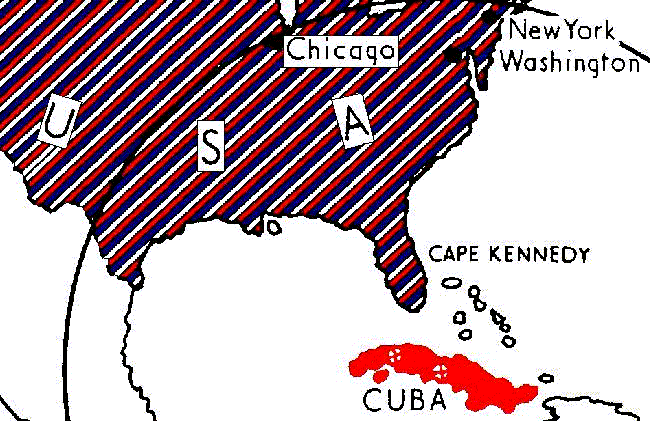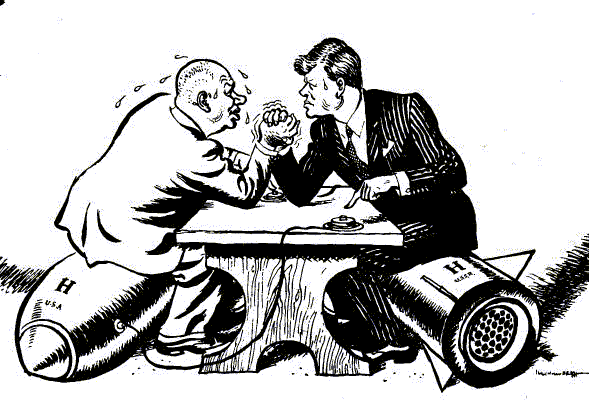|
|
||
CAUSES1. Superpower TensionAll the tensions that had grown up between Russia’s assertive ‘peaceful competition’ and Kennedy’s promise to be tough on Russia – including the space race, the arms race and nuclear testing, American funding of anti-Communists in Vietnam and Laos, the failed Vienna summit (1961) and the Berlin Wall.;
2. Fidel Castro’s CubaIn 1959, Fidel Castro took power in Cuba. This was very threatening to the USA because it was right next to America. In 1960, Castro made a trade agreement with Russia, whereby Cuba sent sugar to Russia, in return for oil, machines and money. This frightened the Americans more, and in 1960 they stopped trading with Cuba. In retaliation, Cuba nationalised all American-owned companies.
3. The Bay of PigsIn April 1961 the CIA encouraged, funded and transported an attempt by anti-Castro Cuban exiles to invade Cuba. It failed miserably, greatly embarrassing Kennedy. In September 1961, therefore, Castro asked for – and Russia publicly promised – weapons to defend Cuba against America.
On 14 October 1962 an American U2 spy-plane took pictures of a nuclear missile base being built on Cuba. Kennedy’s advisers told him he had 10 days before Cuba could fire the missiles at targets in America.
The danger from the missile bases.
Kennedy decided he had to act (see Source A).
|
Going DeeperThe following links will help you widen your knowledge:
The film Thirteen Days – although it is has historical inaccuracies and its portrayal has been questioned – shows the tension of the Cuban Missile crisis.
Other sites are:
BBC site - clear standard account An account hostile to the US
- shocking facts
YouTube TheCuban Missile Crisis - The Closest we Came to Nuclear War- lively account
Podcast:
How dangerous was the Cuba crisis JFK and the end of the Cuba Crisis - debates on the Education Forum (VERY hard)
Consider:1. Study Source A. Why was the issue so important for the Americans? 2. Take each of the causes of the Cuban Missiles crisis, and explain how it caused the crisis
|
|
EVENTS14 Oct: U2 spy-plane takes pictures of Missile bases in Cuba - experts tell Kennedy he has 10 days before they are operational. 16 Oct: Kennedy set up a Committee of the National Security Council to advise him. 22 Oct: Kennedy announced in a televised address to the nation that he was mounting a naval blockade of Cuba. Source AWe will not needlessly risk world-wide nuclear war in which even victory would be ashes in our mouths – but neither will we shrink from that risk when it must be faced . . . I call upon Chairman Khrushchev to stop and dismantle this secret, reckless and provocative threat to world peace. Speech by Kennedy on American TV, 22 October 1962.
B52 nuclear bombers were deployed, so that one-eighth of them were airborne all the time. That night, Oleg Penkovsky – a Western spy working in Russia – was arrested. His last message read: ‘Soviet attack imminent’. 23 Oct: Khrushchev explained that the missile sites were ‘solely to defend Cuba against the attack of an aggressor’. 20 Russian ships were heading for Cuba. 24 Oct: Khrushchev accused America of piracy. He warned that Russia would get ready ‘a fitting reply to the aggressor’. 25 Oct: The first Russian ship reached the naval blockade. It was an oil ship and was allowed through. All the other Russian ships (carrying missiles) turned back. Secretly, the US government offered to remove US missiles in Turkey in exchange for those in Cuba. 26 Oct: Russia was still building the missile bases, and Kennedy started planning a military attack on Cuba - until, at 6pm, Khrushchev sent a telegram to Kennedy, offering to dismantle the sites if Kennedy would lift the blockade and agree not to invade Cuba - the Americans comment: ‘the other fellow just blinked’. The Kennedy brothers saw the Russian ambassador, and again mentioned removing the missiles in Turkey. 27 Oct: Before Kennedy could reply, Khrushchev sent another letter, demanding that Kennedy also dismantle American missile bases in Turkey. On the same day, a U2 plane was shot down over Cuba. It looked as if war was about to happen. Kennedy ignored the plane incident. He also ignored Khrushchev’s second letter – he wrote simply that would lift the blockade and agree not to invade Cuba if Khrushchev would dismantle the missile bases. He also offered secretly to dismantle the Turkish missile bases. 28 Oct: Khrushchev agreed. The crisis finished. 20 Nov: Russian bombers left Cuba, and Kennedy lifted the naval blockade.
|
Did You Know?You can listen to Kennedy and his advisers discussing how to react (audio/transcript) !!! They decided that their options were: 1. Nuclear Strike? It would cause a nuclear war. 2. Conventional attack? There were Russian troops in Cuba, and it would probably lead to a war with Russia. 3. Use the UN? Too slow. 4. Do nothing? The missile bases were too dangerous. 5. Blockade? This would stop the missiles getting to the missile bases, but it was not a direct act of war.
Source B
This British cartoon of 29 October 1962 shows Kennedy and Khrushchev arm-wrestling for power, sitting on nuclear weapons. The caption read: 'OK Mr President, let's talk'.
Did You Know?Kennedy did not publicly agree to dismantle missile bases in Turkey. In a secret telephone call, he told Khrushchev that – while he couldn’t agree to dismantle Turkish bases in a ‘tit-for-tat’ agreement – the USA did not see any need for them and that they would be dismantled soon.
|
|
RESULTS
|
Source CWhat kind of peace do we seek? Not a Pax Americana enforced on the world by American weapons of war. I am talking about genuine peace, the kind of peace that makes life on earth worth living – not merely peace for Americans but peace for all men and women – not merely peace in our time but peace for all time. I speak of peace because of the new face of war. Total war makes no sense in an age when great powers can maintain large and relatively invulnerable nuclear forces. Some say that it is useless to speak of world peace ... until the leaders of the Soviet Union adopt a more enlightened attitude. I believe we can help them do it. But I also believe that we must reexamine our own attitude – as individuals and as a Nation – for our attitude is as essential as theirs. Speech by Kennedy to the American University, 10 June 1963.
Consider:1. Study Source C. How does it differ to Source A? 2. Many textbooks use Source B to re-inforce the idea of 'confrontation' between the superpowers that you can see in Source A. But do you agree – look at the date, and at the caption.
|
|
|
| ||


